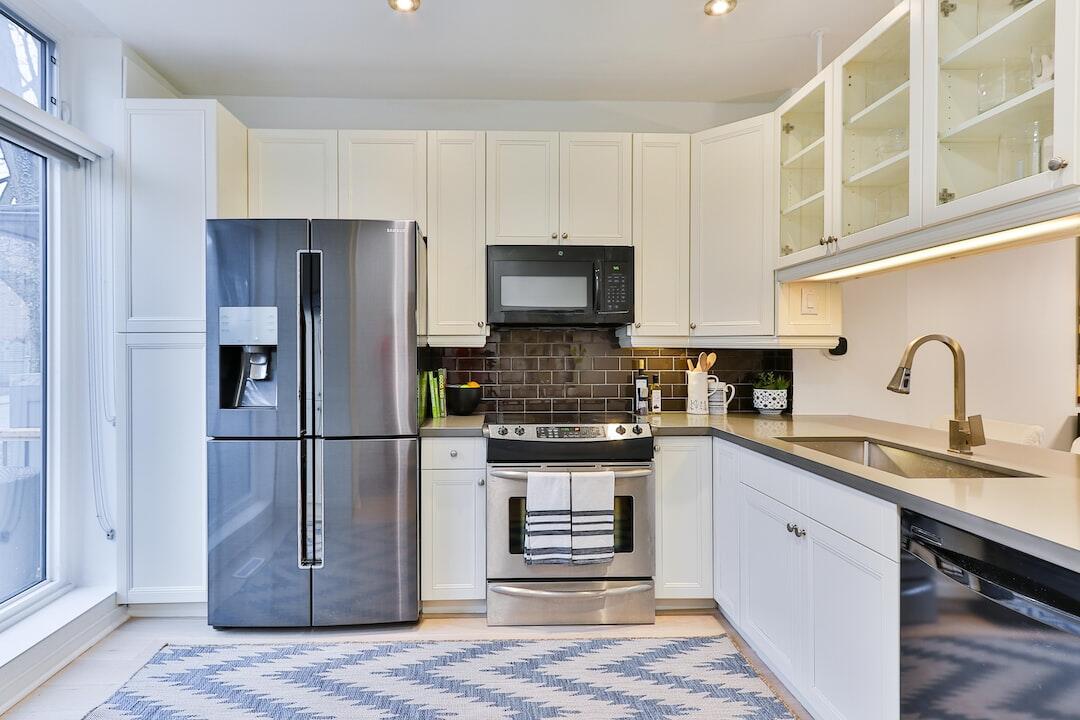According to the Kleinman Center for Energy Policy, Pennsylvania is the nation’s fourth-largest emitter of GHGs (greenhouse gases). Transportation and electricity production are its two leading sources of GHGs, as they are throughout the country. GHGs are a big problem, resulting in the greenhouse gas effect, the primary driver of climate change.
As a Pennsylvania resident, you may have heard that investing in home efficiency upgrades can help combat that problem. But will doing so also help raise property value?
So, does energy efficiency affect property values or not? What are energy-efficient home upgrades anyway, and what benefits do they bring?
In this guide, the real estate experts at First Choice Home Buyers will answer all those questions (and more). Keep reading to discover the connections between energy efficiency, sustainable home design, and property values.
What Does Energy Efficiency Mean, Anyway?
Energy efficiency is the ability to perform the same task or generate the same result using less energy. For example, an energy-efficient home uses less energy to:
- Keep cool in the summer
- Remain warm in the winter
- Generate hot water
- Stay illuminated
- Run appliances and electronics
Energy efficiency allows you to meet the above while consuming less energy, making it critical to achieving a more sustainable home design. Sustainability is vital because it fulfills this current generation’s needs without compromising those of future generations. Therefore, being more sustainable now also allows you to protect your offspring’s future.
So, Does Energy Efficiency Affect Property Values?
Yes, it does. According to EnergyStar.gov, several studies have demonstrated that energy efficiency increases home sale prices between 2% and 8%.
By making your home more energy-efficient, you may be able to sell it for a higher price.
How Do Energy Efficiency Upgrades Boost Property Values?
Energy efficiency upgrades can help homes fetch higher prices because they offer the following:
- Reduced utility bills
- Lower maintenance expenses
- Enhanced in-home comfort
- Potential health benefits
- Lower carbon footprint
Because of those short and long-term benefits, home buyers are willing to pay higher prices for energy-efficient homes. For the same reason, more people now prefer homes with energy-efficient features: A whopping nine in ten home buyers, according to statistics from Today’s Home Owner.
With energy-efficient upgrades, your home becomes more attractive to a broader pool of potential shoppers. The more prospective buyers it draws in, the higher the demand for it and the greater its perceived value. All these can then result in your property fetching a higher price.
A longer list of prospects can also help raise your chances of finding the right buyer for your home. The more options you have, the more likely you’ll receive better, higher offers.
Having more offers can also help you sell your home faster. After all, you won’t have to wait long for someone to make a fair offer on your property.
Even if you decide not to sell your home, you can still enjoy the many benefits of having an energy-efficient home, as we’ll explain in more detail below.
Reduced Utility Bills
Because an energy-efficient home uses less energy, it generates lower utility bills.
Let’s use an electric heat pump as an example, as it’s one of the most energy-efficient types of home heating systems available. According to CarbonSwitch.com, these units (which can heat and cool your home) can be twice to four times more efficient than conventional boilers and furnaces. Because they use far less energy to provide the same home heating and cooling level, they can help lower energy bills by as much as $1,000 yearly.
With lower utility bills, you’ll spend less of your disposable household income on energy. You can then put that money away as an emergency fund or toward a savings account.
Lower Maintenance Expenses
An energy-efficient home also tends to have lower maintenance expenses. One reason is that its appliances, systems, and products that consume less energy have longer lifespans.
Here are some examples.
Light-Emitting Diode (LED) Products
According to the U.S. Department of Energy (DOE), LED light bulbs can exceed the lifespans of traditional incandescent bulbs by up to 25 times. They’re also the most energy-efficient lighting products available today, consuming up to 90% less energy than their incandescent counterparts.
Per the U.S. DOE, switching to LED lights can help homeowners save as much as $225 a year in lighting costs. And because they last longer, they can also help you save by minimizing the need for bulb replacements.
HVAC Systems
When HVAC systems need less energy to operate at peak performance, they are less susceptible to electrical overloads. Overloading can overheat electrical components, speed up wear and tear, and even cause damage. Therefore, an energy-efficient, well-maintained HVAC system can last longer than a non-efficient one as it gets exposed to less electricity and is less likely to overheat.
Energy-efficient HVAC systems that perform at their peak can also help reduce home maintenance costs associated with high humidity levels. Remember, the more humid the inside of your home, the higher the degradation risk of its structural materials and contents. HVAC systems help mitigate this by facilitating optimal ventilation and efficiently dehumidifying indoor air with their cooling component.
Enhanced In-Home Comfort
Energy-efficient homes are usually more comfortable than their non-efficient counterparts because they have:
- No or fewer air leaks
- Better insulation
- Appliances with a quieter operation
Minimal to No Air Leaks
Air leaks occur when conditioned air inside a home exits uncontrollably via cracks, gaps, and holes. Unconditioned outdoor air also enters through these openings. Both can reduce indoor comfort while increasing energy bills by wasting the air the HVAC system has already heated or cooled.
Uncontrolled openings also allow pests to infiltrate your home, reducing comfort. While many pests are only nuisances, some, like roaches and rodents, may pose health and safety risks. For example, these pests may leave droppings and body dust that could trigger asthma or allergy attacks.
Energy-efficient homes resolve or prevent those issues by addressing air leak sources. They have few (if any) unintentional or intentional cracks or openings from where conditioned air can exit, and unconditioned air and pests can enter. They achieve these goals through proper air sealing techniques, such as:
- Caulking
- Weatherstripping
- Installation of foam gaskets and sealants
An energy audit is the best way to start fixing air leaks in your home and making it more energy-efficient. A professional auditor can help you find air leaks and recommend ideal strategies to address them.
Better Insulation
Energy-efficient homes have adequate insulation that helps them better resist heat flow.
For example, during summer, insulation materials in walls, ceilings, and floors help reduce the heat from outside from entering your house. At the same time, they help prevent conditioned air from leaving your home. Then, in the winter, they help contain the warm air from your HVAC system inside your home while blocking cold air from outside.
All of these functions help keep homes more comfortable year-round while reducing heating and cooling costs.
Quieter Appliances
Energy-efficient appliances are usually quieter than their non-efficient counterparts. Thus, they are less audible and intrusive, helping boost indoor comfort.
Energy efficiency strategies like air sealing and insulation can also help with outdoor noise control. Patching openings, for instance, allows less noise to penetrate your house. Better insulation also aids in dampening sounds, which can be especially helpful if your home in Pennsylvania is near a busy road.
Lower Carbon Footprint
Carbon footprint refers to the amount of GHGs, including carbon dioxide (CO2) produced by one’s actions. According to the U.S. EPA, a U.S. household has the following typical annual CO2 emissions or carbon footprints:
- 14,020 pounds for electricity use
- 7,892 pounds for natural gas consumption
- 12,460 pounds for fuel oil use
- 5,766 pounds for propane consumption
Such high household CO2 emissions contribute to GHG build-up in the atmosphere. As mentioned above, GHGs result in the greenhouse gas effect, the primary driver of climate change. So, by reducing your household’s carbon footprint through energy efficiency, you can be one step closer to helping mitigate climate change.
Potential Health Benefits
The more energy-efficient your home is, the fewer fossil fuels it burns directly or indirectly.
For example, you burn less natural gas or propane to heat your home. Using an efficient home cooling system and LED lighting also reduces electricity demand. The lower the latter is, the fewer fossil fuels you indirectly use, considering they are primary sources of electricity.
You want to rely less on fossil fuels because their combustion results not only in GHGs but also pollutants, such as:
- Sulfur dioxide
- Nitrogen oxides
- Carbon monoxide
- Particulate matter
- Mercury
Many of the above pollutants also generate other air contaminants when they reach the atmosphere. For instance, ozone, also called “smog” at ground level, is a byproduct of emissions that undergo chemical reactions when exposed to sunlight.
Air pollution is a severe health threat. As the U.S. EPA explains, it increases the frequency and severity of health problems like lung and heart disease.
If everyone made their homes more energy-efficient, there would be fewer toxic GHGs and air pollutants. As a result, we could breathe fresher, cleaner, and healthier air.
What Are Other Ways to Make Your Home More Energy-Efficient?
Aside from the strategies discussed above, you can also make your home more energy-efficient by:
- Installing a programmable or intelligent thermostat
- Fixing or replacing old and drafty windows
- Maintaining essential systems, like the roofing, HVAC, and plumbing
- Having a professional plumber hunt down and fix water leaks
- Getting appliances serviced or tuned-up
- Turning off the lights in unused rooms
- Unplugging appliances with a standby mode
The more of those strategies you implement, the more energy-efficient your home can get. They can all help bring your carbon footprint down while letting you enjoy more long-term savings.
What if You Can’t Afford Major Energy-Efficient Upgrades?
Many energy-efficient improvements discussed in this guide, especially new HVAC systems and windows, cost a lot. While they’re a worthy expense that can help you sell your home faster and for a higher price, you don’t have to force yourself to shell out money for them if they won’t fit into your budget. Instead, you can focus on minor updates, such as LED light replacements and intelligent thermostats, which cost less.
Alternatively, you can offer your house to a home-buying company like First Choice Home Buyers. If you choose this route, you can enjoy the following benefits.
Sell Your House As-Is
When you sell your house as-is, you don’t have to make any repairs, updates, or improvements. You don’t have to stage it, either. You’ll get a fair offer on your property regardless of its condition.
Of course, you’ll receive a higher offer the better your home’s condition is and the more energy-efficient it is. However, if your budget won’t allow for extensive repairs or projects to boost energy efficiency, that’s fine, too. You can still sell it regardless and avoid hefty repair or improvement expenses.
Complete the Sale Quickly
Another benefit of selling your home to a cash-buying company is the speed of the sale. Depending on how quickly you need to get things done, you may be able to sell in five days or less.
If you need more time, that’s okay, too, as reputable home cash buyers like First Choice Home Buyers will work with your schedule.
Perhaps you need a few more days or a couple of weeks to sort your stuff out, pack, and find a new place to live. In that case, simply let us know, and we’ll develop a buying-selling plan that works best for your schedule.
Sell Your House Fast, Energy-Efficient or Not
And there you have it, the comprehensive guide answering your question, “Does energy efficiency affect property values?” Now you know that it does, impacting it positively while also helping you save money and letting you do your part in taking a stance against climate change.
If you need to sell your house fast but can’t make it more energy-efficient, don’t worry. Our team of experts at First Choice Home Buyers will gladly inspect your home and make a fair offer. As a trusted home-buying company in Pennsylvania with dozens of four and five-star reviews, we typically pay, on average, 15% more than the competition.
Speak with us today to request a free, non-obligatory cash offer for your home!







